These pages announce new publications based on swiss egodocuments.
Albertine de Saussure, Si je ne suis pas heureuse, qui est-ce qui le sera ? Extrait du journal de jeunesse 1776-1782, éd. Sylvie Moret Petrini et Elena Link, Lausanne, Ed. d’En Bas, 2025

À l’âge de 10 ans seulement, la jeune Genevoise Albertine (1766-1841), fille d’Horace Bénédict et d’Albertine Amélie de Saussure, ouvre un journal.Durant 7 ans, la future pédagogue y consigne son quotidien fait de leçons, de rencontres, d’activités de sociabilité et de voyages. Elle confie ses sentiments sur les étapes cruciales de sa jeunesse, marquées par le poids d’une condition féminine qui limite de fait – sans qu’elle ne s’en fasse l’écho ouvertement – ses choix et ses possibilités. Par son ambitieuse formation, à la fois sociale et intellectuelle, Albertine cherche à répondre aux attentes élevées de cette famille de la haute bourgeoisie qui cultive le goût du savoir et de la découverte tout en développant les qualités féminines propres à lui assurer un avenir heureux.
Alors que la plume d’Albertine dévoile la jeunesse de celle dont la postérité retient l’ouvrage en trois volumes L’éducation progressive ou Étude du cours de la vie rédigé vers la fin de sa vie, elle livre dans le même temps un portrait saisissant d’une époque, d’une ville, d’un milieu et d’autant d’acteurs et actrices du passé qui reprennent vie au fil des pages.
***
Lukas Heinzmann, Beten, Beobachten, Berichten, Textgenetische und klimageschichtliche Auswertung des Einsiedler Kloster-Tagebuchs von Pater Joseph Dietrich, 1670–1704, Schwabe Verlag, 2025
Der Einsiedler Mönch Pater Joseph Dietrich führte am Ende des 17. Jahrhunderts mehr als dreissig Jahre lang Tagebuch. Die 18 Bände, die die damalige Lebenswelt eindrücklich schildern, erlauben Einblicke in Dietrichs Wahrnehmung von Natur und Wetter, die sich vor dem Hintergrund der klimatischen Kaltphase des Late Maunder Minimum (1675–1715) und der damit in Bezug stehenden Subsistenzkrise der 1690er-Jahre veränderte.
Der Autor geht auf die zeitgeschichtlichen und kulturellen Entstehungshintergründe des Tagebuchs ebenso ein wie auf Dietrichs Werdegang im Kloster. Neben Fragen nach seiner Motivation und seinem Beziehungsnetzwerk werden auch praktische Aspekte der Tagebuchführung thematisiert. Darauf aufbauend werden die rund 6000 Tagesbeschreibungen zu Natur und Wetter analysiert.
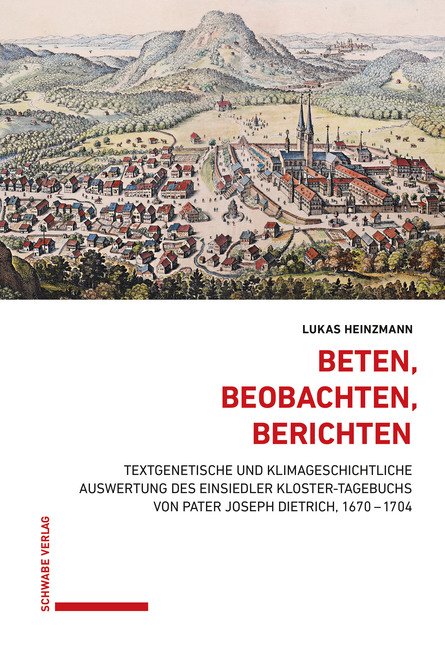
***
Simone de Reyff, D’Adèle à Marcello. Fragments autobiographiques (1876-1879). Fribourg, Archives de l’Etat de Fribourg, 2024 (coll. Bibliotheca Otolandana, vol. 3).

Au terme d’une carrière artistique compromise par la maladie et les obstacles de tout ordre, Adèle d’Affry, alias Marcello, revient sur son passé. On a pris l’habitude de désigner comme ses Mémoires la centaine de feuillets couverts d’une écriture fiévreuse, bousculée par les ratures et les repentirs, qu’elle n’abandonnera qu’au seuil de la mort. Il s’agit en réalité d’un simple assemblage de réminiscences, souvent disparates, que ses proches tentèrent en vain, pour répondre à son désir exprès, de transformer en récit publiable. En dépit de leur caractère inachevé, ces pages méritent toutefois d’être diffusées. Non seulement parce qu’elles sont le reflet d’une intelligence passionnée, qui a su comprendre les enjeux de son temps, mais surtout parce qu’elles révèlent, parallèlement à la figure de l’artiste, un tempérament d’écrivain.
***
Das Tagebuch des St. Galler Fürstabts Pankraz Vorster 1796–1829, Peter Erhart (Hg.), Band 1: 1796–1798. Bearbeitet von Silvia Bärlocher, Sandra Ernst, Lorenz Hollenstein und Anina Steinmann
Der in Neapel geborene Pankraz Vorster war der letzte Fürstabt von St. Gallen. Seine Tagebücher erlauben einen Blick in die Welt eines rastlosen Reisenden, der die Hoffnung auf die Rettung von Land und Kloster nie aufgab. Zwei Jahre nach Pankraz Vorsters Wahl 1796 war mit dem Ende der Alten Eidgenossenschaft und der Besetzung der Ostschweiz durch französische Truppen auch das Schicksal der Fürstabtei besiegelt. Eine Zukunft des Klosters ohne dessen politische und territoriale Rechte war für ihn ausgeschlossen. Im Februar 1798 entschloss er sich angesichts der Bedrohungen durch die Bevölkerung mitten im Winter zur Flucht Richtung Wien. Bereits in Regensburg erhielt er eine Audienz beim Kaiser, der ihm seinen Schutz zusicherte. Dennoch reiste er im Mai mit dem Schiff auf der Donau weiter nach Wien, wo sich sein Interesse für die Naturwissenschaften offenbarte.
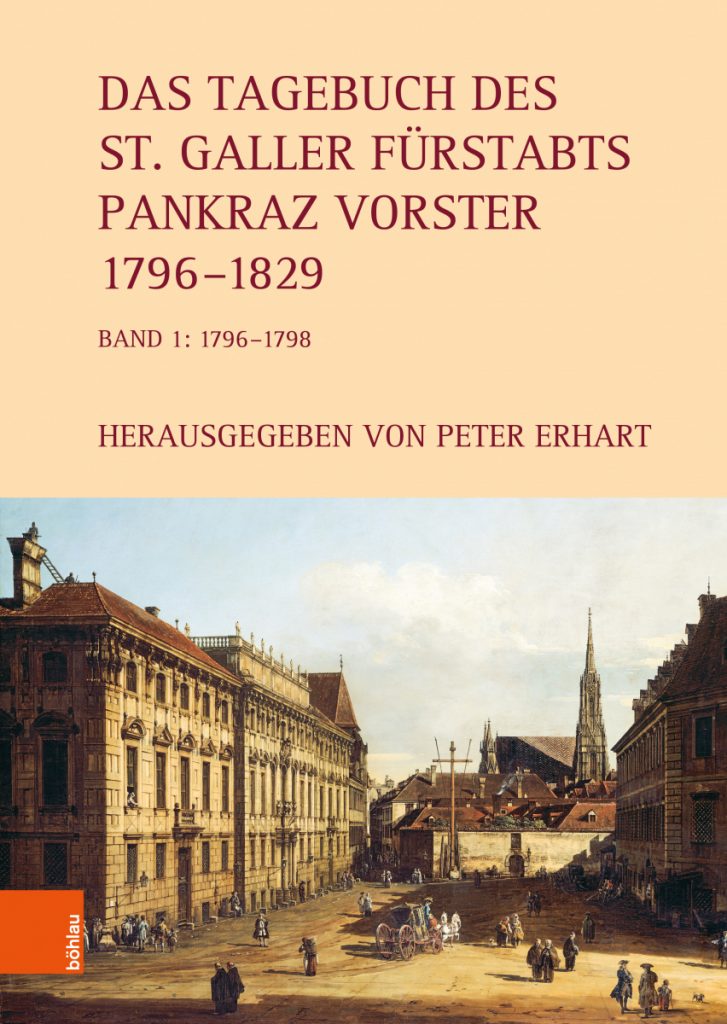
***
Danièle Tosato-Rigo, Margrit Wick-Werder, Marguerite Wildermeth. Une gouvernante biennoise entre les Cours de Berlin et de Saint-Pétersbourg, Intervalles. Revue culturelle du Jura bernois et de Bienne, 128, 2024
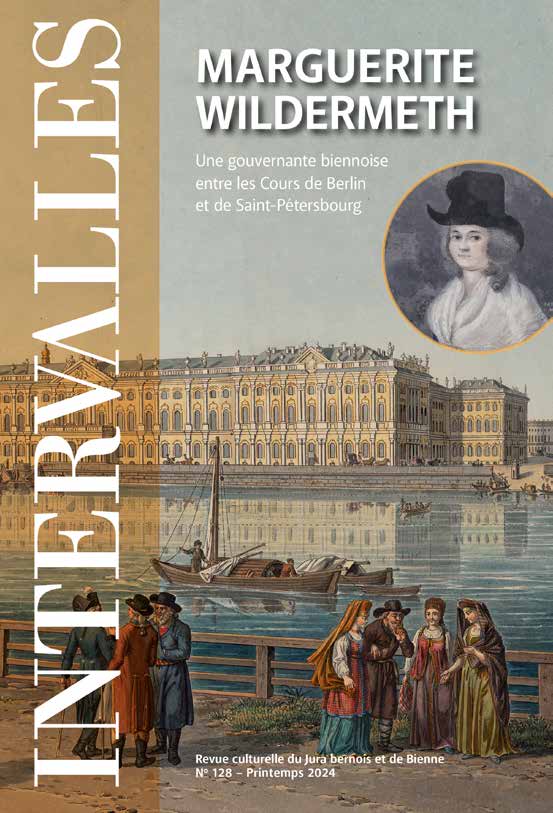
Partie en 1800 à l’étranger comme gouvernante, la Biennoise Marguerite Wildermeth (1777-1839) se voit confier pendant près d’une dizaine d’années la jeune Charlotte de Prusse, future impératrice de Russie. Confidente de « sa » princesse, elle la rejoint à plusieurs reprises à la Cour de Saint-Pétersbourg, et accompagne son ascension en l’entourant de ses conseils.
Injustement tombée dans l’oubli, comme tant d’autres éducatrices suisses dans des Cours européennes, cette diplomate avant la lettre est mise en lumière au fil du volume grâce à une enquête minutieuse dans les archives allemandes, polonaises et russes.
***
Bianchi Stefania, Nicoli Miriam, Women’s Voices. Echoes of Life Experiences in the Alps and the Plain (17th-19th Century), Alphil, 2023
This volume is centred on the voices of women belonging to different generations, religious faiths and social classes, and presents a range of possible life courses in the Alps and the pre-Alps during the Ancien Régime and the early 19th century. Focusing on life trajectories that have emerged from a gender-conscious reading of the sources, the contributions illustrate how migration led women to take on roles of responsibility or follow their husbands in their careers as artists, traders and businessmen. They also reveal a widespread literacy that was combined with practical skills and knowledge marked by biological, legal and religious preconceptions; these features permeated the studied communities, where family, religious and patronage ties prevailed upon the dichotomy of public sphere/private sphere. The essays in this book deal with the web of complex social networks that served to sustain the mutual autonomies as well as the strategies of living together. The vitality and agency of the presented female figures help to dispel the image of backwardness and passivity often associated with women living in mountain regions.
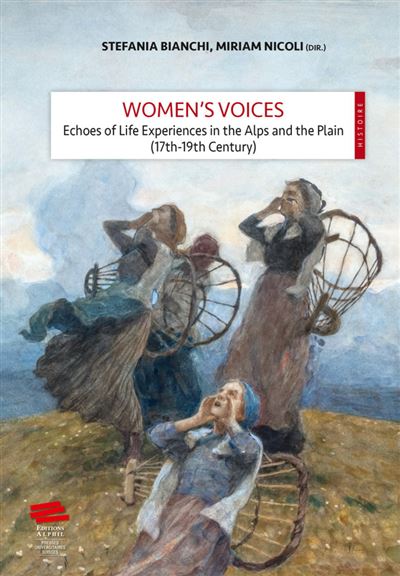
***
Miriam Nicoli e Stefania Bianchi (eds), Leadership economiche e culturali nelle scritture del sé (Ticino-Grigioni, XVIII-XIX secolo), Archivio Storico Ticinese, 172, 2023
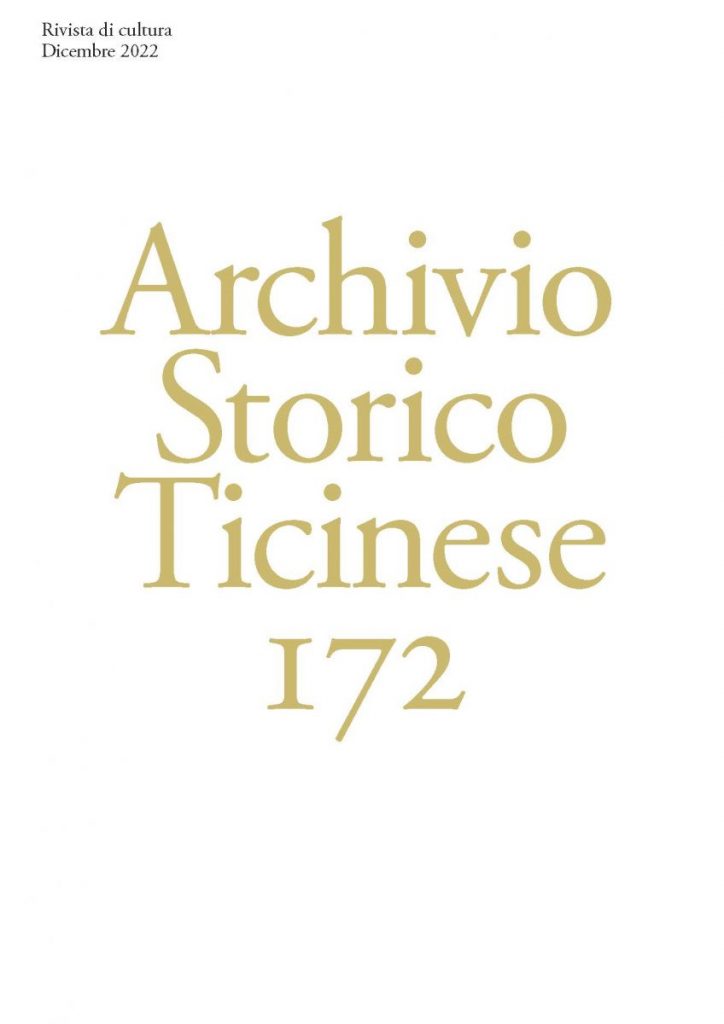
Questo dossier intende restituire sei storie, quelle dei nobili von Salis di Soglio e dei loro legami con l’Inghilterra, dei marmorari Maderni di Capolago con bottega a Verona, dei pasticcieri-caffettieri Cortesi di Poschiavo giunti sino a Cracovia, del locarnese Giuseppe Pioda, futuro ingegnere, allora studente a Napoli, del colonnello Augusto Fogliardi di Melano e del suo soggiorno americano, dell’architetto Carlo Frasca attivo tra Torino e Breganzona.
Autrici e autori, a cui vanno sentiti ringraziamenti da parte della redazione dell’Archivio Storico Ticinesee delle curatrici, hanno indagato, lungo un percorso temporale compreso fra la prima metà del secolo XVIII e la seconda metà del secolo successivo – periodo di grandi transizioni istituzionali e culturali (si pensi alla rappresentazione del sé che nel tempo si traduce in una scrittura più intima e si affida alla fotografia) –, vicende personali e familiari che spaziano nell’Europa e varcano l’oceano, ulteriore conferma di quanto la mobilità economica e insieme “intellettuale” abbia segnato la società alpina ancor prima dei processi di trasformazione della seconda metà dell’Ottocento.
***
Jonas Henri Berthoud, Souvenirs. Une vie au Val-de-Travers entre 1743 et 1831, éd. Jean-Pierre Jelmini, Nouvelle revue neuchâteloise, 2023
Lorsqu’il se met à sa table vers 1818 pour rédiger ses souvenirs les plus mémorables Jonas Henri Berthoud les destine en premier lieu à sa famille. Mais aussi, précise-t-il, à tous ceux qu’ils pourraient intéresser. Et nous en sommes.
Dans les 155 pages d’un gros volume à l’élégante calligraphie, cet horloger réputé, né et mort à Couvet, déroule sous nos yeux les événements qui ont durablement marqué sa mémoire de septuagénaire. On voit donc défiler sous sa plume les grands et les petits moments de la vie communale, les catastrophes naturelles et leur influence sur le quotidien des petites gens, les enterrements pompeux de personnalités locales, les cérémonies officielles, les défilés militaires, les conflits d’opinion ou d’intérêt, mais aussi les soins qu’il va chercher à Berne pour guérir les troubles de sa vue, etc.
En 1764, il nous emmène au cœur du Paris de Louis XV où il se perfectionne dans l’aura de Ferdinand Berthoud. Vingt ans après, il nous entraîne à la cour de justice de Môtiers où l’on juge, condamne et exécute l’auteur d’un crime dont il est le témoin privilégié.
Enfin, c’est lui qui signe le document – visible à la BPUN – qui atteste l’accession de Jean-Jacques Rousseau au rang de communier de Couvet le 1er janvier 1765.
Les notes, commentaires et annexes de Jean-Pierre Jelmini replacent efficacement ces Souvenirs dans leur contexte temporel.

°°°
°°°
